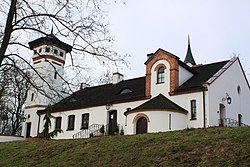| Bugaj | |
|---|---|
| Village | |
 Historic hunting lodge Bażantarnia in Bugaj Historic hunting lodge Bażantarnia in Bugaj | |
 | |
| Coordinates: 52°12′N 17°30′E / 52.200°N 17.500°E / 52.200; 17.500 | |
| Country | |
| Voivodeship | Greater Poland |
| County | Września |
| Gmina | Miłosław |
| Population | 22 |
| Time zone | UTC+1 (CET) |
| • Summer (DST) | UTC+2 (CEST) |
Bugaj is a village in the administrative district of Gmina Miłosław, within Września County, Greater Poland Voivodeship, in west-central Poland. It lies approximately 2 kilometres (1 mi) south-east of Miłosław, 16 km (10 mi) south of Września, and 46 km (29 mi) south-east of the regional capital Poznań.
The name Bugaj comes from the Polish name Boży Gaj ("God's Grove"), and refers to a former place of shelter during foreign invasions and a former Slavic pagan temple. A Polish insurgent unit was stationed in the village during the Greater Poland uprising (1848) against Prussia, and a battle was fought there.
During the German occupation of Poland (World War II), on 20 November 1939, the Germans carried out an execution of three Poles, inhabitants of Izbica Kujawska and Koło, in the village (see Nazi crimes against the Polish nation).
References
- "Central Statistical Office (GUS) - TERYT (National Register of Territorial Land Apportionment Journal)" (in Polish). 2008-06-01.
- ^ "Bugaj". miloslaw.info.pl (in Polish). Archived from the original on 2 April 2015. Retrieved 25 July 2020.
- Maria Wardzyńska, Był rok 1939. Operacja niemieckiej policji bezpieczeństwa w Polsce. Intelligenzaktion, IPN, Warsaw, 2009, p. 276 (in Polish)
| Gmina Miłosław | ||
|---|---|---|
| Town and seat |  | |
| Villages | ||
| Września County | ||
|---|---|---|
| Seat |  | |
| Urban-rural gminas | ||
| Rural gmina | ||
| Counties of Greater Poland Voivodeship | ||
|---|---|---|
| City counties |  | |
| Land counties | ||
This Września County location article is a stub. You can help Misplaced Pages by expanding it. |